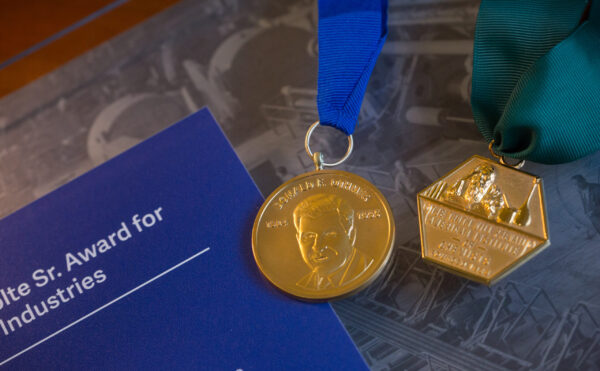American Institute of Chemists Gold Medal
The American Institute of Chemists (AIC) Gold Medal recognizes extraordinary accomplishments in chemistry or chemical engineering in the United States.
First presented in 1926, previous winners include Nobel laureates Glenn T. Seaborg, K. Barry Sharpless, Herbert C. Brown, Elizabeth Blackburn, and Dudley Herschbach, as well as renowned researchers Chad A. Mirkin, Mary Lowe Good, Steven J. Lippard, Jacqueline Barton, and George M. Whitesides.
The AIC Gold Medal has been presented jointly with the Science History Institute since 2003. Winners are honored each spring.
2025 Medalist: Timothy Swager

The 2025 AIC Gold Medal will be presented to Timothy Swager during the Science History Institute Awards ceremony on Wednesday, May 7 at the Institute in Old City Philadelphia.
Timothy M. Swager is the John D. MacArthur Professor of Chemistry at MIT. The Montana native received a BS from Montana State University in 1983 and a PhD from the California Institute of Technology in 1988. After a postdoctoral appointment at MIT, he served on the chemistry faculty at the University of Pennsylvania from 1990 to 1996. He returned to MIT in 1996 as a chemistry professor and served as the head of chemistry from 2005 to 2010.
Swager has published more than 550 peer-reviewed papers and holds more than 130 issued or pending patents. In addition to being an elected fellow of the National Academy of Sciences, the American Academy of Arts and Sciences, and the National Academy of Inventors, he has also received the Linus Pauling Award (2016), the Lemelson-MIT Award for Invention and Innovation (2007), and the Christopher Columbus Foundation Homeland Security Award (2005). Honors from the American Chemical Society include the Carl S. Marvel Creative Polymer Chemistry Award (2005), the Award for Creative Invention (2013), the Polymer Chemistry Award (2019), and the Arthur C. Cope Award (2025).
Swager’s research interests focus on soft materials and polymers for the design, synthesis, and study of organic-electronic, sensory, energy harvesting, membrane, high-strength, liquid crystalline, and colloid materials. He is best known for the invention of the Fido explosives detector (now FLIR Systems), which is a hand-held sensory device that uses amplifying fluorescent polymers to detect trace levels of explosives, comparable to the sensitivity of a bomb-sniffing dog’s nose.
Other areas actively investigated by the Swager Group include radicals for dynamic nuclear polarization, applications of nano-carbon materials, organic photovoltaic materials, polymer actuators, separation membranes, and luminescent molecular probes for medical diagnostics. Swager is the cofounder of several companies, including DyNuPol, Iptyx, PolyJoule, C2 Sense, ArO-X, MoxAir, and Xibus Systems, and has served on a number of corporate and government boards.
Winners of the AIC Gold Medal
- Peter Schultz (2024)
- K. Barry Sharpless (2023)
- Brian Hoffmann (2022)
- Peter J. Stang (2021)
- Henry F. Schaefer III (2019)
- E. Gerald Meyer (2018)
- Stephen Lippard (2017)
- Chad Mirkin (2016)
- Jacqueline Barton (2015)
- Ronald Breslow (2014)
- John D. Roberts (2013)
- Elizabeth Blackburn (2012)
- Dudley Herschbach (2011)
- Robert Grubbs (2010)
- Oliver Smithies (2009)
- Paul Berg (2008)
- Walter Gilbert (2008)
- George Whitesides (2007)
- Roald Hoffmann (2006)
- Robert L. McNeil Jr. (2005)
- Carl Djerassi (2004)
- Ralph Hirschmann (2003)
For a full list of winners of the AIC Gold Medal going back to 1926, visit the AIC’s website.
About the American Institute of Chemists
From its earliest days in 1923 to the present, the American Institute of Chemists has fostered the advancement of the chemical profession in the United States.
The AIC has a corresponding dedication “to promote and protect the public welfare; to establish and maintain standards of practice for these professions; and to promote the professional experience through certification as to encourage competent and efficient service.”



